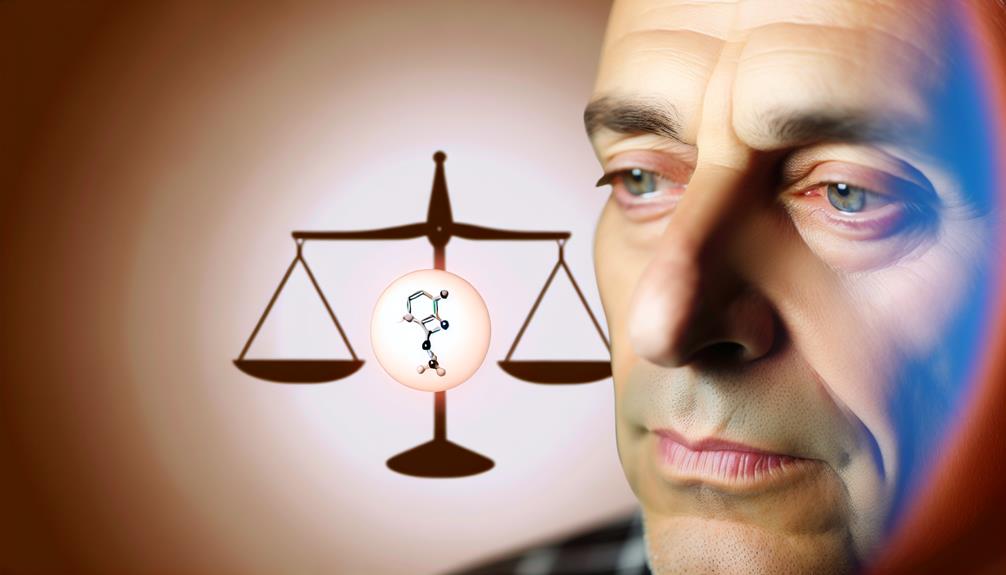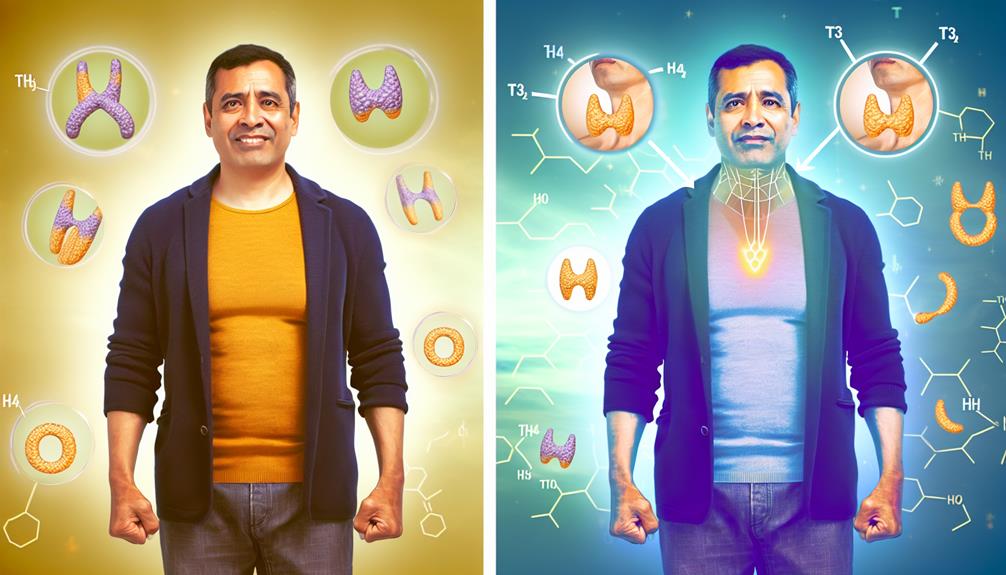After turning 40, I noticed some key hormonal changes affecting my health. Testosterone levels gradually decline, which can lead to reduced energy, muscle mass, and libido. As estrogen levels may rise relative to testosterone, I experienced weight gain and mood swings. Additionally, growth hormone and thyroid function decrease, impacting metabolism and recovery. Elevated cortisol, often from stress, can exacerbate fatigue. By making informed lifestyle adjustments—like improving my diet, exercising regularly, and managing stress—I've been able to better navigate these changes. Exploring these factors further can help improve overall well-being during this stage of life.
Overview of Hormonal Changes

As men reach their 40s, they often experience significant hormonal changes that can affect various aspects of their health. These age-related changes can disrupt hormonal balance, leading to a range of physical and psychological symptoms. One of the primary hormones affected is testosterone, which typically begins to decline gradually during this decade. However, it's important to recognize that hormonal balance is not solely dictated by testosterone levels; other hormones like estrogen and cortisol play essential roles as well.
During this period, I've noticed that fluctuations in these hormones can lead to changes in mood, energy levels, and even muscle mass. For example, increased estrogen levels relative to testosterone can contribute to weight gain, particularly around the abdomen. Additionally, an elevation in cortisol, often linked to stress, may lead to fatigue and a decreased ability to recover from physical exertion.
Furthermore, the thyroid gland can also become less efficient with age, impacting metabolism and overall energy levels. These changes can create a complex interplay of symptoms that are often dismissed as merely a part of aging. It's critical to understand that while these hormonal shifts are common, they don't have to dictate our health outcomes. By addressing lifestyle factors, such as diet, exercise, and stress management, we can potentially mitigate some of these effects and maintain a healthier hormonal balance as we age. Awareness of these changes empowers us to take proactive steps in managing our health.
Decline in Testosterone Levels
The decline in testosterone levels is a notable concern for men over 40, impacting various aspects of health and well-being. It's common for men in this age group to experience a gradual decrease in testosterone production, often leading to symptoms that can affect daily life. Understanding these changes is fundamental for maintaining hormonal balance.
As I've learned, this decline can manifest in several ways:
- Reduced energy levels and increased fatigue
- Decreased muscle mass and strength
- Lowered libido and sexual performance
- Mood changes, including increased irritability or depression
Testosterone replacement therapy (TRT) has emerged as a viable option for many men seeking to mitigate these effects. By restoring testosterone levels, TRT can help improve energy, enhance mood, and maintain muscle mass. However, it's essential to approach this therapy under the guidance of a healthcare professional, as improper use can disrupt hormonal balance and lead to other health issues.
Moreover, lifestyle changes can also play a significant role in managing testosterone levels. Regular exercise, a balanced diet, and adequate sleep are essential components that can support hormonal health. It's important to recognize that while testosterone decline is a natural part of aging, addressing it proactively can lead to better overall health outcomes.
For those of us traversing this phase of life, understanding testosterone's role is important in promoting a healthier and more fulfilling lifestyle.
Increased Estrogen Production

With aging, many men may experience an increase in estrogen production, a change that can greatly impact their overall health. This increase often leads to a condition known as estrogen dominance, where the levels of estrogen in the body surpass those of testosterone. This imbalance can result in various physical and emotional symptoms, including weight gain, mood swings, and decreased libido.
As men reach their forties and beyond, the natural decline in testosterone levels can create a void that estrogen fills, exacerbating the issue. It's important to understand that while estrogen plays a significant role in male physiology, too much of it can disrupt hormone balance, leading to adverse effects. For instance, elevated estrogen levels can contribute to the development of gynecomastia, a condition characterized by enlarged breast tissue in men.
To combat increased estrogen production, it's essential to focus on maintaining hormone balance through lifestyle choices. Regular exercise, a healthy diet rich in fiber, and avoiding environmental estrogens found in certain plastics and personal care products can help mitigate the effects of estrogen dominance. Additionally, monitoring hormone levels through blood tests and consulting with a healthcare provider can provide insights into one's hormonal health status.
Changes in Growth Hormone
While managing increased estrogen levels is important, it's equally essential to reflect on the changes in growth hormone production that occur as men age. The aging process leads to a gradual decline in growth hormone (GH) levels, which can greatly impact various aspects of health and fitness. As GH diminishes, I've noticed changes in muscle recovery, body composition, and overall vitality.
This reduction in growth hormone can affect not just how my body looks but also how it performs. Lower GH levels can hinder athletic performance and slow down recovery times, making it more challenging to achieve fitness goals. Additionally, inadequate growth hormone can impact sleep quality and immune function, further complicating the aging journey.
Here are some key factors to reflect on regarding growth hormone changes:
- Muscle Recovery: Slower recovery can lead to longer periods of soreness and fatigue.
- Body Composition: Increased fat mass and decreased lean muscle can occur without adequate GH levels.
- Longevity Factors: Maintaining ideal GH levels may contribute to overall longevity and health.
- Hormone Therapy: Exploring options like hormone therapy might help mitigate some of the declines in GH, potentially enhancing athletic performance and promoting better health outcomes.
Understanding these changes can empower us to take proactive steps toward maintaining our health as we age. By focusing on growth hormone levels, we can better navigate the challenges associated with aging and pursue our fitness goals with renewed vigor.
Impact on Thyroid Function

As men age, particularly after 40, I've observed a notable decline in thyroid hormone production that can profoundly affect metabolism and energy levels. This decrease can lead to symptoms such as fatigue and weight gain, which are often mistakenly attributed solely to aging. Understanding the interplay between hormonal changes and thyroid function is essential for maintaining overall health during this stage of life.
Thyroid Hormone Production Decline
Thyroid hormone production typically declines as men age, particularly after 40. This decrease can notably impact thyroid health and hormone regulation, leading to a variety of health issues. I've noticed that as we age, our bodies' ability to produce sufficient thyroid hormones diminishes, which can have a cascading effect on overall well-being.
Here are some key points to reflect on:
- Symptoms: Reduced hormone levels may lead to fatigue, weight gain, or mood changes.
- Diagnosis: Regular check-ups and blood tests are essential for monitoring thyroid function.
- Diet: Proper nutrition plays an important role in supporting thyroid health; iodine and selenium are especially important.
- Lifestyle: Managing stress and getting adequate sleep can help mitigate some of the effects of hormone decline.
Understanding these factors is imperative for maintaining ideal thyroid health after 40. By being proactive and informed, we can better navigate the hormonal changes that naturally occur and work towards sustaining our overall health. It's important to consult with a healthcare professional for personalized advice and treatment options.
Metabolism and Energy Levels
Over time, I've observed that metabolism and energy levels in men over 40 can greatly be influenced by thyroid function. The thyroid gland plays an essential role in hormonal regulation, affecting energy balance and overall metabolic rate. When thyroid hormone production declines, many of us may experience shifts in weight management and insulin sensitivity, leading to a higher risk of metabolic syndrome.
To combat these changes, it's important to focus on sleep quality and the impact it has on hormone levels. Insufficient sleep can disrupt thyroid function and exacerbate fatigue. Additionally, incorporating regular physical activity is vital; it can help stimulate metabolism, improve energy levels, and enhance insulin sensitivity.
Nutrient timing also matters. Consuming a balanced diet with an emphasis on nutrient-dense foods can support thyroid health and overall metabolic function. By optimizing our dietary habits and ensuring adequate exercise, we can better manage our energy levels and counteract the natural decline in thyroid function as we age. In this way, understanding and addressing these factors can greatly improve our quality of life as we navigate the challenges of aging.
Cortisol and Stress Responses
Experiencing heightened stress levels can lead to significant increases in cortisol, the body's primary stress hormone. As I navigate life over 40, I've noticed that managing stress becomes increasingly vital. Elevated cortisol levels can have a profound cortisol impact on various bodily functions, including metabolism, immune response, and even muscle mass. This is particularly important for men like us, as we may already be dealing with other hormonal changes that can affect our overall well-being.
Understanding cortisol's role in stress responses is essential for developing stress resilience. Here are some key points I've learned that can help us manage our stress and mitigate cortisol's negative effects:
- Physical Activity: Regular exercise can lower cortisol and improve overall stress levels.
- Mindfulness Practices: Techniques such as meditation and deep breathing can help reduce stress and promote relaxation.
- Adequate Sleep: Prioritizing sleep can regulate cortisol levels and enhance recovery from daily stressors.
- Balanced Nutrition: Consuming a well-rounded diet supports hormonal balance and can improve stress resilience.
Effects on Mood and Emotions

As men age, hormonal shifts can greatly influence mood and emotional well-being. One of the most notable changes is the decline in testosterone levels, which can lead to mood swings and decreased emotional resilience. This hormonal fluctuation can considerably impact mental health, often resulting in feelings of irritability and anxiety.
I've found that understanding these psychological effects is essential for coping effectively. By recognizing the connection between hormonal changes and emotional regulation, it's easier to adopt effective coping strategies. For instance, engaging in regular physical activity can serve as a powerful form of stress relief, helping to stabilize mood and enhance overall emotional well-being.
Furthermore, it's important to acknowledge how these changes can affect relationship dynamics. Increased irritability or mood fluctuations can strain social connections, making it imperative to communicate openly with loved ones. This transparency fosters understanding, which can ease tension and help maintain strong relationships.
Self-esteem can also take a hit during this phase due to the psychological effects of aging, leading to feelings of inadequacy. However, by focusing on building emotional resilience through supportive social networks, I've noticed a marked improvement in my overall outlook. Engaging with friends and family can provide the emotional support needed to navigate these challenging times.
Changes in Libido and Sexual Health
As men age, particularly after 40, I've noticed that decreased testosterone levels can markedly impact libido and sexual health. This hormonal shift often leads to difficulties with erections and can intertwine with emotional well-being, affecting overall confidence and intimacy. Understanding these changes is essential for addressing sexual health concerns effectively.
Decreased Testosterone Levels
Many men over 40 notice significant changes in their testosterone levels, which can profoundly impact libido and overall sexual health. As I've explored this topic, it's clear that decreased testosterone can lead to a variety of symptoms that many might find concerning.
Here are some effects of lower testosterone levels:
- Reduced sexual desire or libido
- Difficulty achieving satisfaction during sexual activity
- Increased fatigue and decreased energy levels
- Mood changes, including irritability or depression
Understanding these changes can be essential for maintaining a healthy sex life. Testosterone therapy has gained attention as a potential treatment option for men experiencing symptoms of low testosterone. This therapy involves administering testosterone through injections, patches, or gels to restore hormonal balance. Additionally, hormone supplements can also play a role in managing low testosterone levels, though it's essential to consult a healthcare professional before starting any regimen.
Impact on Erections
Decreased testosterone levels can considerably influence erection quality and overall sexual function. As I've experienced, this decline often leads to reduced libido, making it more challenging to achieve and maintain an erection. When testosterone levels drop, the physiological response to sexual arousal can diminish, which in turn impacts the blood flow necessary for an erection.
The interplay between testosterone and erection quality is vital; if testosterone is low, the body's ability to respond to sexual stimuli is compromised. This can create a cycle where diminished sexual performance leads to decreased sexual confidence, further exacerbating the situation.
I've noticed that, alongside reduced erection quality, psychological factors often come into play. For instance, the fear of not performing well can create anxiety, which can further hinder sexual function. Understanding this connection between hormonal changes and sexual health is essential.
If you're facing similar challenges, it's important to consult with a healthcare professional. They can provide insights into potential treatments or lifestyle changes that may help restore both testosterone levels and sexual confidence, ultimately improving erection quality.
Emotional Well-being Factors
Emotional well-being plays an essential role in changes to libido and sexual health, particularly for men over 40. As I navigate this stage of life, I've come to realize that emotional intelligence and mental resilience are vital for maintaining a satisfying sexual relationship. Stress coping mechanisms can greatly influence my emotional health, which in turn affects my libido.
To enhance my emotional well-being, I focus on several key factors:
- Self-awareness: Understanding my feelings and their impact on my sexual health has been transformative.
- Social connections: Nurturing relationships with friends and loved ones helps alleviate stress and fosters a supportive environment.
- Coping strategies: Implementing effective coping strategies has empowered me to manage anxiety and improve my mental resilience.
- Relationship dynamics: Open communication with my partner has strengthened our bond, positively affecting our sexual connections.
Recognizing how emotional well-being intertwines with physical health has been enlightening. By prioritizing these factors, I've observed a notable improvement in my libido and overall sexual health, proving that emotional well-being is foundational for men over 40.
Muscle Mass and Strength Decline

As men reach the age of 40 and beyond, they often experience a noticeable decline in muscle mass and strength due to hormonal changes, particularly the gradual decrease in testosterone levels. This decline can considerably impact my physical capabilities and overall quality of life. Testosterone plays an essential role in muscle protein synthesis, and lower levels can lead to reduced muscle mass and strength.
I've noticed that my muscle recovery has also slowed down. After a rigorous strength training session, it takes longer for my muscles to repair and rebuild, which can be frustrating. This delay in recovery is attributed to hormonal fluctuations that affect not just muscle growth, but also the body's ability to recover effectively.
Engaging in regular strength training is necessary for combating these changes. I've found that resistance exercises can help maintain muscle mass and counteract the effects of aging. However, I must be mindful of my recovery periods; they're just as important as the workouts themselves. Incorporating adequate rest and proper nutrition has become essential to my routine.
Additionally, I've realized that focusing on compound movements, such as squats and deadlifts, can yield better results because they engage multiple muscle groups. Keeping track of my progress and adjusting my training regimen accordingly has allowed me to adapt to these hormonal changes. Understanding the relationship between hormone levels, muscle mass, and strength is key to steering through this phase of life effectively.
Fat Distribution and Metabolism
With changes in muscle mass and strength often comes a shift in fat distribution and metabolism. As I age, I've noticed that my body composition isn't what it used to be. The hormonal balance shifts, particularly testosterone and growth hormone, can lead to increased fat storage, especially around the abdomen. This change can contribute to abdominal obesity, which is not just a cosmetic issue but a vital health concern.
I've learned that my metabolic rate tends to decrease with age, resulting in lower energy expenditure. This means I need to be more mindful of my dietary habits and overall weight management strategies. To combat these changes, I've focused on several key factors:
- Prioritizing lean muscle gain through resistance training
- Monitoring my insulin sensitivity to help regulate blood sugar levels
- Adapting my dietary habits to include more whole foods and balanced macronutrients
- Incorporating regular physical activity to boost my metabolic rate
Understanding these aspects has helped me navigate the challenges of aging. It's clear that maintaining lean muscle is essential not only for appearance but also for enhancing metabolic function. By being proactive about my health and making informed choices, I aim to manage my body composition effectively and mitigate the risks associated with hormonal changes. Emphasizing these practices can greatly impact our overall health as we age.
Importance of Lifestyle Adjustments

As men age, particularly after 40, making informed lifestyle adjustments becomes essential for managing hormonal changes effectively. I'll explore how nutrition and diet, regular exercise, and stress management techniques can greatly impact overall health and well-being. By focusing on these areas, we can better support hormonal balance and enhance quality of life.
Nutrition and Diet
Nutrition plays an essential role in managing hormonal changes for men over 40. As I navigate this phase of life, I've realized that incorporating appropriate dietary adjustments can greatly impact my overall health and well-being. It's not just what I eat, but how I approach nutrition that matters.
Here are some key dietary adjustments I've found helpful:
- Increase protein intake: This supports muscle mass and hormone production.
- Focus on healthy fats: Omega-3 fatty acids, found in fish and flaxseeds, can enhance hormone function.
- Prioritize whole foods: Fruits, vegetables, and whole grains provide essential nutrients that support hormonal balance.
- Consider nutritional supplements: A multivitamin or specific supplements like vitamin D can help fill any dietary gaps.
Exercise and Fitness
Dietary changes are only part of the equation when addressing hormonal shifts in men over 40; exercise and fitness play a vital role as well. Implementing a balanced fitness regimen that includes strength training, cardio routines, and flexibility exercises is essential for maintaining ideal body composition and overall health.
I've found that resistance training can greatly boost testosterone levels, which often decline with age. Focusing on compound movements helps enhance workout consistency and maximizes results. Meanwhile, incorporating aerobic activities—like jogging or cycling—improves cardiovascular health and supports fat loss, aligning with my fitness goals.
Flexibility exercises, such as yoga or dynamic stretching, are essential for injury prevention and maintaining range of motion, especially as we age. Additionally, recovery techniques, including proper hydration and rest days, are vital for muscle repair and growth.
Stress Management Techniques
Many men overlook the impact of stress on hormonal balance, especially as they age. Stress can lead to elevated cortisol levels, which in turn can disrupt testosterone and other hormone levels. To effectively manage stress, I've found that incorporating specific techniques into my daily routine is essential.
Here are some stress management techniques that can be beneficial:
- Mindfulness practices: Regularly engaging in mindfulness can enhance emotional regulation and decrease stress levels.
- Relaxation techniques: Activities like yoga or guided imagery promote a state of calm, helping to reduce anxiety.
- Breathing exercises: Simple deep breathing exercises can activate the body's relaxation response, providing immediate relief from stress.
- Time management: Prioritizing tasks and setting realistic deadlines can greatly reduce the feeling of being overwhelmed.
Seeking Professional Guidance
As I navigate the complexities of hormonal changes after 40, seeking professional guidance becomes vital for understanding my unique health needs. I've come to realize that the fluctuations in hormones like testosterone can greatly affect my physical and mental well-being. To address these issues effectively, I prioritize hormonal testing through a healthcare professional. This testing helps identify imbalances and provides a clear picture of my hormonal profile.
A professional consultation is essential. It allows me to discuss my symptoms, concerns, and lifestyle factors that may be contributing to hormonal changes. During this consultation, my healthcare provider evaluates my overall health through thorough health screenings. These screenings can reveal underlying conditions that might not be evident otherwise, ensuring a holistic approach to my health.
After understanding my hormonal status, I can collaborate with my provider to create personalized plans tailored to my specific circumstances. These plans might incorporate lifestyle changes, exercise regimens, or even hormone replacement therapy if deemed necessary. The key is that I'm not trying to navigate this complex journey alone; instead, I'm leveraging the expertise of professionals who can guide me toward ideal health.
Frequently Asked Questions
What Natural Supplements Can Help Balance Hormones in Men Over 40?
When it comes to balancing hormones, I've found that certain natural supplements can offer significant support. Herbal remedies like ashwagandha and fenugreek have shown promise in promoting hormonal balance. Additionally, nutritional support through vitamins D and B6, along with omega-3 fatty acids, can help optimize overall health. It's vital to combine these with a healthy lifestyle for the best results, ensuring my body gets the support it needs during this phase of life.
How Do Sleep Patterns Affect Hormonal Changes in Older Men?
I've noticed that sleep patterns greatly affect hormonal fluctuations in older men. Poor sleep quality can lead to increased cortisol levels, which disrupts testosterone production and other essential hormones. When I prioritize good sleep, I feel more balanced, and my energy levels improve. It's important to establish a consistent sleep routine and create a conducive environment for rest, as these factors can help mitigate the impact of hormonal changes and enhance overall well-being.
Can Hormonal Changes Lead to Hair Loss in Men Over 40?
Hair loss can be a heartbreaking hurdle as we age. I've noticed that hormonal changes, particularly testosterone decline, play a vital role in this process. When testosterone decreases, dihydrotestosterone (DHT) can have an intensified impact, shrinking hair follicles and leading to thinning hair. It's essential to understand that these shifts aren't just cosmetic; they're a clear signal from our bodies. Addressing them early can help mitigate the effects of this frustrating phenomenon.
What Role Does Diet Play in Managing Hormonal Imbalances?
I've found that diet plays a vital role in managing hormonal imbalances. Nutrient timing is essential; consuming the right nutrients at specific times can optimize hormone production. For instance, incorporating healthy dietary fats into my meals has helped support testosterone levels. I've noticed that balancing my macronutrients while focusing on whole foods allows me to feel more energized and stable, showcasing the profound impact diet has on overall hormonal health.
Are There Specific Exercises That Can Boost Testosterone Levels?
When it comes to boosting testosterone levels, it's fascinating how the right exercises can make a significant difference. On one hand, strength training is essential; on the other, high-intensity workouts can elevate hormone production even further. I've found that incorporating compound movements like squats and deadlifts into my routine works wonders. By pushing my limits, I not only build muscle but also help optimize my testosterone levels effectively.
